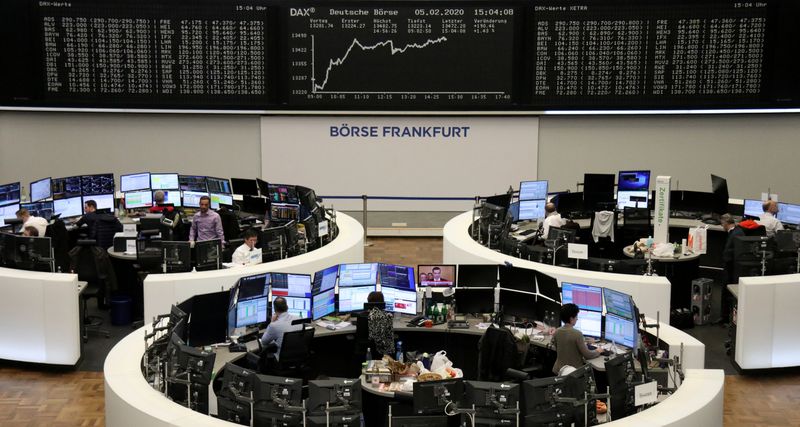By Tom Wilson
LONDON (Reuters) - Stock markets across the world rose on Thursday, buoyed by record highs on Wall Street and a move by China to halve tariffs on some U.S. goods that emboldened bets that the global economy would avoid long-term damage from the coronavirus.
Momentum from Wall Street spilled into European markets from Asia, gathering pace as investors assessed prospects for help to the global economy from government stimulus and looser central bank policy.
Europe's STOXX 600 (STOXX) index gained 0.5% to a record high, with a swathe of strong earnings reports helping. Indexes in Frankfurt (GDAXI), Paris (FCHI) and London (FTSE) all made solid gains, rising between 0.3% and 0.6%.
Italy's biggest bank UniCredit (MI:CRDI) rose 5.5% after it posted a lower-than-expected fourth-quarter net loss.
China said on Thursday it would halve tariffs on some U.S. goods, which could help improve negotiating conditions for a second phase of a trade accord after the two countries signed off on an interim deal last month.
The move, which came after China's central bank eased policy last weekend, helped MSCI's broadest index of Asia-Pacific shares outside Japan (MIAPJ0000PUS) jumped 1.6%. Bluechip Chinese shares gained 1.9% (CSI300).
U.S. stock futures (ESc1) rose 0.3%, while the MSCI world equity index (MIWD00000PUS), which tracks shares in 49 countries, gained 0.4%.
Markets were already beginning to emerge from safe-haven assets and bet on the virus being a short-term shock, even while the human toll continues to grow.
"The market is looking through the near-term disruption to activity and seeing potential for quite a sharp rebound later this year on the back of even looser policy," said Tim Drayson, head of economics at Legal & General Investment Management.
Evidence of appetite for riskier bets was apparent in currencies, where China's onshore yuan
The safe haven Japanese yen slipped to a two-week low against the dollar
Bond yields also rose. The 10-year U.S. Treasuries yield climbed to 1.672% (US10YT=RR) from a five-month low touched on Friday. Euro zone bond yields told a similar story, with German bund yields (DE10YT=RR) climbing to their highest in almost two weeks.
Investors said that reflationary policies were supporting equity markets.
"Over the last few weeks, central banks came in and said they are ready to support the market whenever there is a weakness," said Didier Anthamatten, a portfolio manager at Unigestion. "Equity investors are basking in the ocean of liquidity."
"SHORT-TERM SLUMP"?
Another 73 people on the Chinese mainland died on Wednesday from the virus, the highest daily increase so far, bringing the total death toll to 563, the country's health authority said on Thursday.
Statistics from China indicate that about 2% of people infected with the new virus have died, suggesting it may be deadlier than seasonal flu but less deadly than SARS, another reason that investors remain relatively calm.
Traders also cited vague rumors of a possible vaccine for the coronavirus as a trigger for Wednesday's stock rally, even though the World Health Organization has played down media reports of "breakthrough" drugs.
"The coronavirus is continuing to spread so we need to remain cautious. But markets now appear to think that there will be a quick economic recovery after a short-term slump," said Masahiro Ichikawa, senior strategist at Sumitomo Mitsui DS Asset Management.
(Graphic: Daily cumulative cases of coronavirus JPG, https://graphics.reuters.com/CHINA-HEALTH/0100B56G2WC/coronavirus.jpg)
On Wall Street, the S&P 500 (SPX) and Nasdaq (IXIC) had both reached record highs after jobs and service sector indicators suggested the economy could continue to grow this year even as consumer spending slows.
Elsewhere, major currencies were largely quiet. The euro stood flat at $1.0996 (EUR=), while the dollar against a basket of six major currencies (DXY) slipped a fraction to 98.262.
Oil futures rose for a second day, boosted by potential OPEC+ action to counter faltering demand after the coronavirus outbreak and optimism on better prospects for U.S.-China trade tensions .
Brent (LCOC1) rose by 11 cents, or %0.2, to $55.38 a barrel by late morning, having risen 2.4% in the last session. It is down about 15% so far this year.
Copper, considered a good gauge on the health of the global economy because of its wide industrial use, stabilized somewhat despite remaining on the back foot.
Shanghai copper (SCFc1) extended its rebound into the third day, rising 1.4% from 33-month low hit earlier this week.
